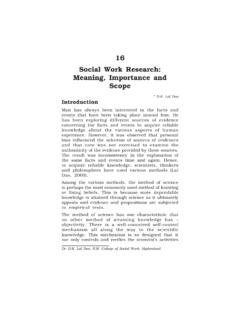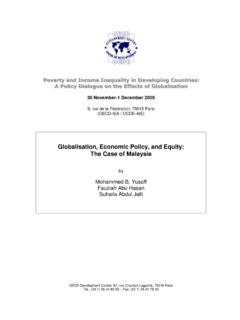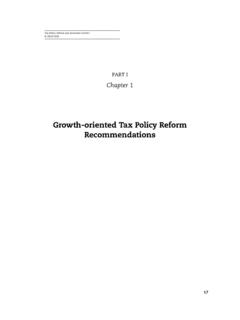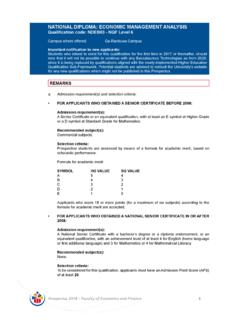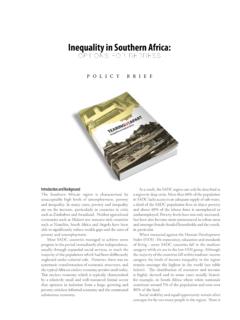Transcription of 25 Social Planning and Social Policy - IGNOU
1 204 Social Work Intervention with Individuals and Groups 25. Social Planning and Social Policy * Renu Sharma Introduction This chapter seeks to help you understand the concept of Social Planning and Social Policy . It will enable you to appreciate the interrelationship between Planning , Policy and development as the ultimate objective. It will also acquaint you with Social Planning experience in India since last fifty years, which would help you understand as to how approach and focus of Planning and policies have shifted over a period of time in accordance with the changing socio-economic and political realties. Concept of Social Planning Planning is the process of preparing a blueprint of actions to attain stated objectives within a time frame. The determination of objectives, the specifications of targets, the strategy for mobilization of resources, the allocation of outlays to different development sectors, the blueprint of actions (including their operationalisation in the shape of policies, programmes and their delivery system).
2 Are aspects which have to be considered in any Planning exercise. defines Planning as the process of making rational decisions about future goals and future courses of action, which relies upon explicit tracing of repercussions and the value implications associated * Dr. Renu Sharma, TISS, Tuljapur Social Planning and Social Policy 205. with alternative courses of action and in turn requires explicit evaluation and choice among the alternative matching goal- action sets. Alfred J. Kahn defines Planning as follows: Planning is Policy choice and programming in the light of facts, projections and application of values. All of this may be summarized briefly as; Planning is Policy formulation and realization through choices and rationalization. Planning is essential because it enables us to formulate with some precision what we intend to achieve within a given time frame.
3 Prioritization among various objectives enables us to demarcate the more important objectives from those, which are less so. Once this is done one can decide what is feasible considering the resources at hand and how additional resources can be mobilized. Therefore, Planning is a more scientific path towards achieving development objectives, and for bringing about economic and Social transformation in a systematic manner. Perhaps, the most important reason, which comes to your mind, may be that you are faced with a severe shortage of certain resources/factors. Given the fact that each of these may also have different uses, you may be unable to decide how to utilizes these resources. It is in such a situation that Planning becomes extremely important. Therefore, you must plan the use of resources in some rational manner.
4 The Need for Planning in India An underdeveloped economy like India is characterized by inequalities of incomes and ownership of assets. The high incidence of poverty, coupled with these 206 Social Work Intervention with Individuals and Groups inequalities, makes the task of development particularly important. There are also regional imbalances and problems connected with the development of areas, which are disadvantaged due to geographical and ecological factors (as for example drought-prone areas, flood-prone areas etc). Needless to say, Planning in India has to be geared to meet these challenges. Concept of Social Policy Broadly speaking, the term Policy ' refers to the general guidelines or principles, which give direction to a particular course of action by the government or by an organisation. It also refers to, in a very specific sense, an intended or executed course of action.
5 Definitions of Social Policy An attempt to define Social Policy is beset with many practical difficulties. Is there one Social Policy with capital S and P or are there multiple Social policies with small s and small p? This question is relevant because we have Social policies compartmentalized into a Policy for scheduled castes, a Policy for backward classes, a Policy for weaker sections, a Policy for women, a Policy for children and so on. Does an addition of these policies make up a whole Social Policy ? We have Directive Principles of State Policy , the Fundamental Rights and the preamble to the constitution. Do these make up a Social Policy ? In the light of the above dilemmas, in the following section, we attempt to define Social Policy : Social Policy can be referred to both in the plural and singular case.
6 When referred to in the plural, it denotes comprehensive and integrated set of policies in the Social sectors such as health, Social welfare, education, Social security etc., when used in singular the term Social Policy refers to a specific governmental Policy such Social Planning and Social Policy 207. as the Policy towards the SCs and STs, the Policy for providing universal education etc. Definitions of Social Policy According to David Gill: Social policies are priniciples/. course of action designed to influence: i) the overall quality of life in a society;. ii) the circumstances of living of individuals and groups in that society; and iii) the nature of intra- societal relationships among individuals, groups and society as a whole. According to Kulkarni Social Policy is the strategy of action indicating means and methods to be followed in successive phases to achieve the declared Social objectives.
7 Marshall states that the term, Social Policy refers to the Policy of governments with regard to action having a direct impact on the welfare of citizens, by providing them with services or income.. According to Prof. Titmuss, Social Policy represents a summation of acts of government, deliberately designed to improve the welfare of people. While summarizing the whole discussion, it can be said that Social Policy is a deliberate action on the part of individuals, collectivities and governments, undertaken to organise services, opportunities and Social action so as to affect the life-styles of people and initiate a process to prevent, postpone, initiate and manage change. Characteristics of Social Policy 1) Many writers on Social Policy including such well- known names like Titmuss, Donnison and Boulding 208 Social Work Intervention with Individuals and Groups have stressed that the distinguishing trait of Social Policy is its distributional or redistributive character.
8 Thus the concern of Social Policy is with Social and economic justice based on the principle of equality, which means that the redistribution of Social resources should take place from the better off sections towards the worse off sections of society. 2) The second characteristic of Social Policy is its concern with weaker and vulnerable sections of society such as poor, women, children, disabled, backward classes so as to bring them at par with the rest of society. Thus Social policies visualize of an egalitarian society where inequalities are reduced to minimum level. 3) Another characteristic of Social Policy is that Social policies do not exist in isolation. These are determined to a large extent by the socio-political scenario of a nation, its economic viability and last but not the least, by socio-cultural ethos of people of the nation.
9 Now after Liberalisation, Globalisation and Privatization, policies have become global and changes in one corner of the world definitely leave impact over rest of the world. Most live example of this feature is the opening up of economy by most of third world countries in accordance with guidelines of World Bank and International Monetary Fund. Objectives of Social Policy 1) It is frequently stated that Social policies aim to bring about Social change. In the final analysis all Social policies are government policies as stated by Marshall and Boulding. As part of the operation of the government, Social Policy cannot hope to introduce fundamental changes in society, which Social Planning and Social Policy 209. would mean undermining the status quo on which government rests. Whether in the socialist countries or in the capitalist countries, the Social Policy cannot usher in the fundamental structural change.
10 It can only achieve moderate Social change, whereby certain undesirable conditions of a section or sections of society are redressed and as a result Social tension is minimized. 2) Pinker has argued that objective of Social Policy is minimization of sufferings and maximization of welfare. 3) Another objective of Social Policy is improvement of quality of life of people. It is necessary to ask whose quality of life that we want to improve? This is a pertinent question in developing countries like India where majority of the population live in conditions of serious deprivation, without being able to get even the basic necessities for survival. They are said to be living in absolute poverty or below the poverty line. According to World Bank the estimates of poor population in the developing countries is 57%.








